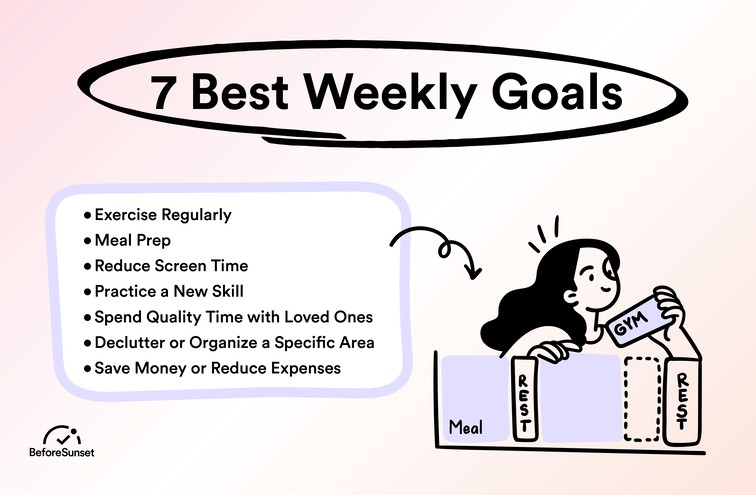We know that life can be busy and overwhelming, and it can be tough to stay on track with our goals and make lasting changes. That's why we want to share with you the power of setting and achieving weekly goals.
Weekly goals are a great way to focus on specific tasks or habits that we want to accomplish in a shorter time frame. By setting goals on a weekly basis, we can break down larger, long-term goals into smaller, more manageable steps. This can help us feel a sense of accomplishment and progress, which can increase our motivation and productivity.

The Benefits of Setting Weekly Goals
The benefits of setting weekly goals go beyond just increased productivity. Research has shown that setting goals can improve our well-being, boost our self-confidence, and even lead to a longer lifespan. By setting and achieving weekly goals, we can create positive habits and a sense of purpose, leading to a more fulfilling and satisfying life.
So, if you're ready to take control of your life and make lasting changes, join us as we explore the 7 best weekly goals and how to set and achieve them. Together, we can create a brighter and more fulfilling future.
7 Best Weekly Goals
Now that we've introduced the concept of setting and achieving weekly goals, let's dive into some specific goals that can greatly impact your life. Here are 7 of the best weekly goals to consider:

1. Exercise Regularly
Exercise is an important aspect of overall health and well-being. When we engage in physical activity, our bodies release endorphins, which can improve our mood and reduce stress. Regular exercise can also improve our physical health, including helping to maintain a healthy weight, reducing the risk of chronic diseases such as heart disease and diabetes, and strengthening our muscles and bones.
Incorporating exercise into your weekly routine can be challenging, especially if you're new to working out or don't have a lot of time. That's why it's important to find physical activities that you enjoy and that fit into your schedule. Some options might include going to the gym, taking a walk or running outdoors, joining a sports team or group fitness class, or trying a new workout video at home.
It's important to find a balance when it comes to exercise. Overdoing it can lead to burnout or injury, while not doing enough can hinder the benefits. Aim to get your body moving at least a few times a week, and gradually increase the intensity and duration as you feel comfortable. Remember to listen to your body and always consult with a healthcare professional before starting a new exercise program.

2. Meal Prep or Preparing Healthy Meals
Eating a nutritious, well-balanced diet comes with countless benefits. However, it can be difficult to make healthy eating choices when we're busy or don't have the time to cook. That's where meal prep or meal planning comes in.
Meal prep involves cooking and preparing meals in advance, often on the weekends or on a designated day of the week. This can save time and effort throughout the week, as you won't have to worry about what to cook for each meal. It can also help ensure that you're eating healthy, as you can control the ingredients and portion sizes of your meals.
Meal planning is a similar concept, but it involves simply planning out your meals for the week rather than cooking them in advance. This can be as simple as making a list of what you want to eat for breakfast, lunch, and dinner each day, or as detailed as creating a grocery list and menu for the week.
Both meal prep and meal planning can help you stay on track with your health goals, as they allow you to make healthy choices and control portion sizes. They can also save you time and money, as you'll be less likely to eat out or make impulsive, unhealthy purchases.
If you're struggling to make healthy eating choices, consider setting a goal to meal prep or meal plan each week. This can help you take control of your diet and fuel your body with the nutrients it needs.

3. Reduce Screen Time
In today's digital age, it's easy to get caught up in our screens and spend hours scrolling through social media, watching TV, or playing video games. While there's nothing wrong with using technology in moderation, excessive screen time can have negative impacts on our health and well-being.
One potential negative impact of excessive screen time is disrupted sleep patterns. The blue light emitted by screens can interfere with the production of melatonin, a hormone that helps regulate sleep. As a result, using screens before bedtime can make it harder to fall asleep and may result in poor-quality sleep.
Another potential negative impact of excessive screen time is decreased social interactions. As we spend more time on our screens, we may be less likely to engage in face-to-face conversations or activities with others. This can lead to feelings of loneliness and isolation, which can have negative impacts on our mental health.
If you're concerned about your screen time, consider setting a goal to reduce it each week. There are a few ways you can do this:
Set limits on certain apps or activities:
Many apps and devices allow you to set daily or weekly limits on how much time you can spend on them. Consider setting limits on social media, video games, or other activities that you find yourself spending too much time on.
Find alternative activities:
Instead of spending time on screens, consider finding alternative activities that you enjoy. This could include hobbies such as reading, crafting, outdoor activities, or social activities such as hanging out with friends or volunteering.
Create screen-free zones or times:
Consider designating certain areas or times of day as screen-free zones. For example, you might make your bedroom a screen-free zone after a certain time, or designate certain times of day as screen-free.
By setting a goal to reduce your screen time each week, you can take control of your technology use and improve your overall health and well-being.

4. Practice a New Skill or a Hobby
Learning new skills or hobbies can be a fun and fulfilling way to spend our time. Not only can it be enjoyable, but it can also have numerous benefits for our mental and physical health.
For one, learning new things can keep our brains sharp and prevent cognitive decline. When we engage in activities that challenge our brains, we stimulate the growth of new neurons and connections, which can improve our memory and cognitive function.
In addition, learning new skills or hobbies can boost our self-esteem and confidence. When we accomplish something that we've never done before, it can give us a sense of accomplishment and pride. This can translate into other areas of our lives, making us feel more capable and competent overall.
If you're looking to add more enjoyment and meaning to your life, consider setting a goal to practice a new skill or hobby each week. This could be anything from learning to play a musical instrument, trying a new craft, or picking up a new sport. The options are endless, and the benefits are numerous. So go ahead and try something new – you might just discover a new passion!
5. Spend Quality Time with Loved Ones
When we have supportive and meaningful relationships, we tend to be happier, healthier, and more resilient. However, it's easy to get caught up in our daily routines and neglect our relationships.
That's why it's important to make a conscious effort to spend quality time with our loved ones. Whether it's our family, friends, or romantic partner, making time for the people we care about can help strengthen our bonds and improve our overall well-being.
There are many ways to spend quality time with loved ones, depending on your preferences and schedules. Some options might include:
Having a weekly dinner with your family: Scheduling a weekly dinner or family meal can help you make time for each other and catch up on what's been going on in each other's lives.
Going on a date with your partner: Making time for a date night can help you reconnect with your partner and strengthen your bond. This could be as simple as going out to dinner or trying a new activity together.
Catching up with a friend over the phone or in person: Keeping in touch with friends is important for maintaining strong relationships. Make a goal to catch up with a friend each week, whether it's over the phone, in person, or via video chat.
By setting a goal to spend quality time with your loved ones each week, you can strengthen your relationships and improve your overall well-being.

6. Declutter or Organize a Specific Area
Clutter and disorganization can be a source of stress and frustration and can drain our energy and focus. If you're feeling overwhelmed by clutter or disorganization in your home or workspace, consider setting a goal to declutter and organize a specific area each week.
There are a few steps you can take to declutter and organize a specific area:
Identify the area you want to declutter and organize: This could be a room, a closet, a garage, or even just a small corner of your home.
Gather the necessary supplies: You'll likely need bags or boxes for tossing or donating items, labels or markers for labeling containers, and storage solutions such as bins or baskets.
Sort through your items: Take everything out of the area you're decluttering and sort it into piles based on what you want to keep, toss, or donate. Be ruthless in this step – if you haven't used an item in a while or it doesn't serve a specific purpose, consider getting rid of it.
Assign a place for everything: Once you've sorted through your items, assign a specific place for everything. This could mean using storage solutions such as bins or baskets to contain similar items or using labels to clearly mark where things go.
By decluttering and organizing a specific area each week, you can improve the functionality and aesthetic of your home or workspace. This can help you feel more organized, in control, and focused, and can save you time and energy in the long run.
7. Save Money or Reduce Expenses
Saving money and reducing expenses can be a challenging but rewarding goal. By setting a goal to save a specific amount of money each week or finding ways to reduce your expenses, you can take control of your finances and work towards your financial goals.
There are many different ways to save money or reduce expenses, depending on your personal circumstances and priorities. Some options might include:
Cutting back on unnecessary purchases:
Take a close look at your spending habits and see if there are any areas where you can cut back. This could include things like eating out less often, canceling subscriptions you don't use, or finding cheaper alternatives for items you regularly purchase.
Reducing your energy consumption:
By making small changes to your energy usage, you can save money on your energy bills. This could include things like turning off lights when you leave a room, using energy-efficient appliances, or sealing drafts to keep your home more energy efficient.
Finding ways to save on groceries:
Groceries can be a significant expense, but there are ways to save on your food budget. Consider buying in bulk, using coupons, or looking for deals at your local grocery store. You can also try meal planning or meal prep to save money on eating out.
By setting a goal to save money or reduce expenses, you can take control of your finances and work towards your financial goals. Whether you want to build up your savings, pay off debt, or just have more financial stability, this goal can help you make progress toward a more financially secure future.
Set Weekly Goals and Take Control of Your Routine
In conclusion, setting and achieving weekly goals can be a powerful way to make lasting changes in your life. Whether you want to improve your physical and mental health, strengthen your relationships, or take control of your finances, there is a goal that can help you make progress toward your goals.
Remember, the key to achieving your goals is to be consistent and persistent. It's okay if you don't see progress right away – just keep working towards your goals and you'll eventually see the results you desire. So don't be afraid to set big goals and take the steps necessary to achieve them – you have the power to make lasting changes in your life.

How to Use Time Tracking to Achieve Weekly Goals
If you're struggling to find the time to work on your weekly goals, a time management tool might be just what you need to get organized and stay on track. BeforeSunset helps you plan your day, prioritize tasks, and track your progress, all in one place.
Don't let a lack of time hold you back from making lasting changes in your life. Try our time management tool today and see how it can help you stay on track and achieve your weekly goals. Click here to get started!

